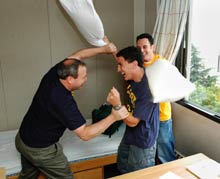Berkeleyan
Helter-shelter? Far from it...
Matching roommates for armies of undergrads combines the techniques of applied science and the instincts of high art
![]()
| 26 August 2004
In the wake of move-in weekend, as more than 5,000 undergrads hunker down to size up their new roommate (whether future friend-for-life or slob-from-hell), campus staff in charge of making those fateful matches dream of the former scenario and prepare for the latter; but they’re pleased when they achieve something in between.
“It comes down to can they get along and not inconvenience each other, and — the highest goal — can they create a space that supports each student’s academic goals?” says Michelle Kniffin, assistant director of the Residential and Student Service Programs’ (RSSP) housing assignments office, where the science and art of roommate matching is practiced.
For more than a decade, a computer program has held up the science end of the equation. Its algorithms sort 5,100 students into 2,400 rooms (singles, doubles, and triples) in seven halls, taking into account students’ lottery numbers (used to determine dorm, not room, assignments) and their living habits — smoking or nonsmoking, sleep schedules, sociability, and study habits. (At one time students got to specify even their major and their musical tastes. “We were asking too many questions,” says Kniffin. By the time students landed in their dorm rooms, “they were expecting a clone of themselves.”)
These days, once bottom-line requirements are matched, Britney fans and Schubert aficionados are expected to co-exist, and threatening to go ballistic if anyone touches your bed won’t get you a single room.
Most of the campus’s singles go to students with disabilities or special needs. “We house students with a range of special considerations,” says Kniffin, “from Tourette’s, kidney transplant, diabetes, Albinism, gender presentation, and eating disorders to religious practices requiring 5 a.m. chanting.” In the past few years, they have also arranged housing for students as young as 15 and as old as 49. “It’s frightening sometimes how involved I get in students’ lives and their needs,” Kniffin says. “I think about the butterfly effect, how small events change lives; that’s just what I do every day when I change roommates.”
Halls in the family
 Cal freshman Joel Eidelson, center, is the third in his family to inhabit 414 Norton Hall. His father, John (at left), was there first, then big brother Michael. The three staged a pillow fight while installing Joel in the room on Move-In Sunday. Mom, also an Old Blue, met John at a dorm dinner way back when. (Peg Skorpinski photo) |
Housing assignments are complete by August 1, when students can go online to find out their residence hall and the name of their future roommate. After making initial contact by phone or e-mail, “a lot of people are really excited about their roommate,” says RSSP administrator Nancy Jurich — citing, as example, the satisfied incoming freshman whose SoCal roommate has promised to teach him how to surf.
Skill, diplomacy required
But, not surprisingly, questions and complaints start coming in as soon as assignments go public; many of the calls come from mom or dad.
“Parents always want to know about storage space: ‘how far off the floor is the bed?’ ‘how many feet above the closet?’” says fifth-year “super senior” Sopheary Khlok, who works in Housing Assignments. Coed bathrooms (which students themselves voted to institute) concern many parents ... as does whether they’ll be able to reach their child or stay overnight in their dorm room. “A lot of parents call for the student,” Khlok observes. “They feel the need to be the ‘overperson.’ But it’s the student who signs the housing contract.”
Complaints reveal the quirks and warts of human nature. Many requests for reassignment (“She’s bringing a tuba; I hate music!” or “I need to get out of my triple; I just got a nose job and my dad will kill me if I hit my nose on the bunk bed”) get polite “no’s” from housing staff.
Protests that come with the disclaimer “but I’m not prejudiced” often require a measure of skill and diplomacy in response. The campus’s theme programs (environments for students who share a specific academic interest or topic) “have sometimes been a challenge for us,” says longtime Housing Assignments staffer Eddie Malone. “Especially the LGBT program [for lesbian, gay, bisexual, and transgender students]. We get a lot of calls from parents saying they don’t want their son or daughter in that environment. We have to educate them.”
When Kniffin fields complaints of this nature — “my roommate is 40; my roommate is Asian; my roommate is gay” — she talks about Berkeley “as a place of tolerance and diversity, where all members of the campus community are expected to develop and maintain respect and civility.” She tells the student, “I want you to think about it.” On occasion she’s even been known to say, “I want you to think about whether Berkeley is the right place for you.”
In the end, despite Housing Assignments’ best efforts, a number of students (this year, about 50) file a transfer request on move-in day — most of them hoping to move from a triple to a double. But by the time they’re contacted regarding their transfer, says Kniffin, “about half will have changed their mind because they’ll have bonded with their roommates or floormates.” She adds that the number of transfer requests has decreased over the last few years: “I attribute this to a better job matching up roommates.”
That’s good news, especially now that the housing market has loosened up. When on- and off-campus housing are both scarce, as they have been since the late ’90s, students feel lucky to get a spot at all. This year the campus has built new housing (for 1,100 additional students), as have local developers. “When supply is greater than demand,” Kniffin says, “the emphasis turns to good matches.”

